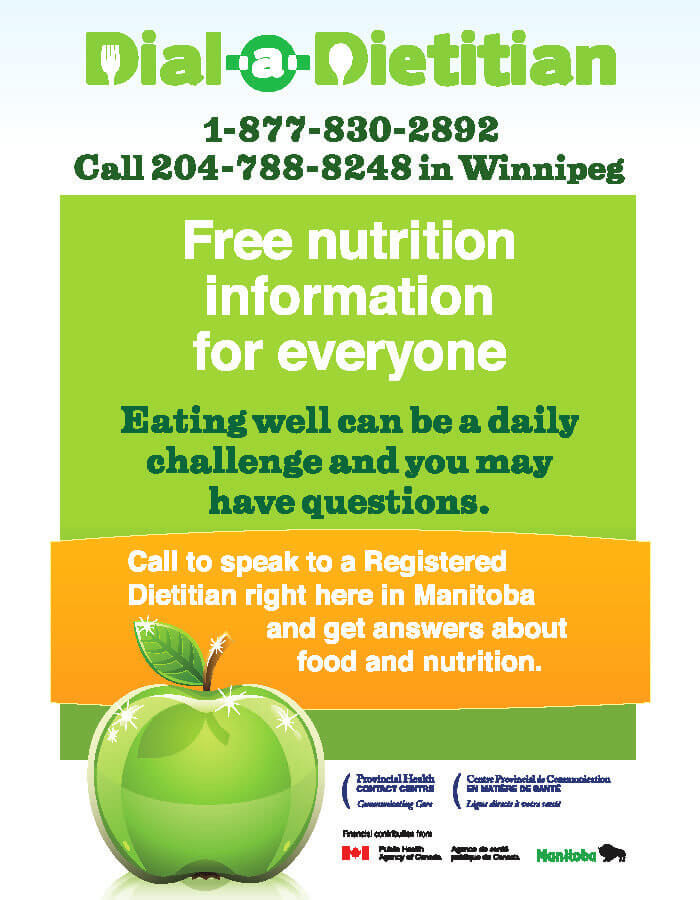Good fats, bad carbs…but what about protein?
By Coralee Hill, registered dietitian, Dial-a-Dietitian
You may have noticed carbohydrates, or “carbs,” have become associated with unhealthy eating or being “bad,” while coconut and keto diet trends have led to a revival of fat as being “good.” All the while, protein has remained relatively neutral – until now.
Protein has been emerging as the popular macronutrient – especially with the plant-based protein emphasis in Canada Food Guide and the rise of the “meatless” meat burgers and products.

What is protein?
Protein is an essential component of muscle and body tissue like skin, hair, and nails. Protein is also involved in producing hormones and antibodies, building enzymes and is a source of calories or energy. Protein is often promoted for bodybuilding and the management of diabetes and body weight. Protein as part of a meal can help with feelings of satiety and to slow down the rate of absorption of glucose (sugar), keeping blood glucose more stable.
What are sources of protein?
Protein is easily found in the Canadian diet. Meat, including beef, pork, poultry and wild game, seafood, eggs, tofu, milk and dairy products like cheese and yogurt as well as legumes, nuts, and seeds all provide high levels of quality protein. Cereals, grains, and some vegetables like green peas, potato, asparagus, and corn also provide dietary protein. Some manufacturers have added whey, soy or pea to boost the protein content in products like granola bars, bread, and ice cream.
Header How much protein do you need?
Bodies need only a modest amount of protein to function well. There are times, such as after surgery, during pregnancy, while breastfeeding and in early childhood or adolescence, when more protein is needed for cell growth or repair.
For adults, the current international Recommended Dietary Allowance (RDA) for protein is 0.8 g per kilogram of body weight. The RDA is defined as the level of protein required to offset a deficiency in 98 per cent of people. Endurance athletes and certain health conditions may warrant higher levels—1.2 to 1.4 grams per kilogram of body weight. Endurance and strength athletes in active training for a sports event or competition would benefit from individualized nutrition consulting.
Using 0.8 grams per kilogram of body weight, the average 65-kilogram (143-pound) adult woman requires 52 grams of protein per day, while an 80-kilogram (176-pound) man requires 64 grams of protein. The Institute of Medicine recommends people get at least 10 per cent of their daily calories, but not more than 35 per cent, from protein. According to the 2015 Canadian Community Health Survey, Canadians consume enough protein—about 17 per cent of their total calories.
Is more protein better?
Unless you are one of those people mentioned earlier, more is not necessarily better. Although research is mixed, there has been some speculation that 25-30 grams of protein is the maximum that can be processed at one time. One study in the Journal of American Dietetic Association, (2009) found that more than 30 grams of protein in a single meal does not further enhance the stimulation of muscle protein synthesis in young and elderly. This is something to consider when thinking about using protein powders. Often promoted to athletes and people who want to gain muscle mass, most protein powders have at least 20 grams of protein per scoop. Some powders can have a lot more. Protein beyond what your body needs or used to build muscle is broken down into glucose and used for energy. And when there is more food energy than needed, the excess is stored as fat.
While total daily protein requirement is good to know, it may be more important how protein is divided over the day into meals and snacks.
What does a man need to eat to get 64 grams of protein in a day?
Protein needs can be easily met by choosing a variety of protein-rich foods at meals and snacks if needed. A sample meal day including one egg, one toast, three-quarter cup of yogurt topped with blueberries for breakfast; a sandwich with tuna (two ounces) on two slices whole wheat bread along with one cup of vegetable soup, mini carrots and one-cup milk or soy beverage for lunch; chicken breast (three ounces) with small baked potato, carrots, salad and fruit for supper all adds up to almost 90 grams protein spread over three simple meals! No snacks, powders or protein-added foods required.
If you’re concerned about your protein needs, speak with a registered dietitian. Dietitians are a phone call away by calling Dial-a-Dietitian toll free 1-877-830-2892 or 204-788-8248 in Winnipeg. Registered dietitians are passionate about the potential of food to enhance lives and improve health.

